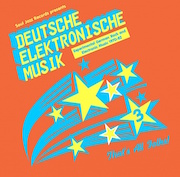There are many potential futures contained within this exemplary Soul Jazz compilation, the label’s third and presumably (given the sparkly “That’s All Folks” adorning the sleeve artwork) final selection documenting the ever fertile kosmische sounds of 1970s Germany. Deutsche Elektronische Musik 3: Experimental German Rock and Electronic Music 1970-82 gives us 23 glimpses of possible realities and reconstructed artistic psyches as a new generation strove to rebuild among the ashes and destruction left to them. No discernible musical genre dominates and there is little which might make the casual listener think, in recognition, Ah, yes, this is ‘krautrock’.
One of the few pieces here which very much would fit that retrospective definition is NEU!’s ‘Neuschnee’, recorded in 1973 and now sounding like four of the most influential minutes of music from that decade. Notorious as the track from which NEU! 2’s second side extrapolated multiple tape-manipulated variations, in its original form ‘Neuschnee’ has everything the krautrock fan might expect to encounter: glistening guitar work, motorik beat and effortless propulsion towards some far distant and shining horizon. Needless to say, neither age nor 45 years of countless ripped-off degradations have dented NEU!’s distillation of future-thinking forward momentum. You can hear whole timelines of the next half century in music being formed out of ‘Neuschnee’.
But, obviously, there is so much else. Alongside other notables here, including Roedelius in ruminative chamber music mode and Pyrolator’s harsh electro-pop, are a wealth of fascinating artists who haven’t, near half a century on, found themselves filling vast concert halls or releasing culture section friendly best-of albums. There’s Klaus Weiss with two miniatures which marry electronic jiggle and pop with jazz-funk rhythms as well as his Niagara ensemble whose ‘Rhythm Go’ from 1973 sounds like a kaleidoscopic drum clash between numerously refracted Mtumes and Al Fosters.
Further jazz explorations come with the smoky fusion of Missus Beastly on ‘Geisha’, with a sharply focused rock beat backing bouncing funk bass, nasty streetwalking keyboards and declamatory flute soaring high above. If there’s a 1970s-set West German cop show in production, surely this must be the theme. There’s the glitter punk stomp of La Dusseldorf’s ‘White Overalls’ and the quite blissfully deranged 12-minute new wave mini-opera which is Michael Bundt’s ‘Neon’, a paean to the fast-emerging “…cold cream of the city…” with “…disciples sitting in cyborg cafes…” under the “…new born Star of Bethlehem…”. It’s as though Diamond Dogs had been compressed into a glowing steel trap for acolytes to worship around before screaming, “Lead me to my pinball machine!”. You really haven’t heard anything quite like it.
Throughout these two discs is an examination of the relationship between urban and rural, and of the mental and physical interzone one must cross in order to travel between these two settings. In Deutsche Wertarbeit’s ‘Deutscher Wald’, Streetmark’s ‘Passage’ and Cluster’s ‘Hollywood’ comes the sense of embarkation, of taking flight upon the autobahn in pursuit of new and as-yet-undetermined versions of these futures. In some far off remote forested glade, there’s Dzyan, Popol Vuh and Broselmaschine who, on 1971’s ‘Schmetterling’, offer up the most idealistic yet welcomely realised sense of pastoral reawakening and free-spirited halcyon days. These are pieces of music in which anyone weary of 2018’s battering-ram annihilator times might wish to linger a while. Soul Jazz really deserve so much praise for this release. It’ll shine a light of hope through the darkest of months.


